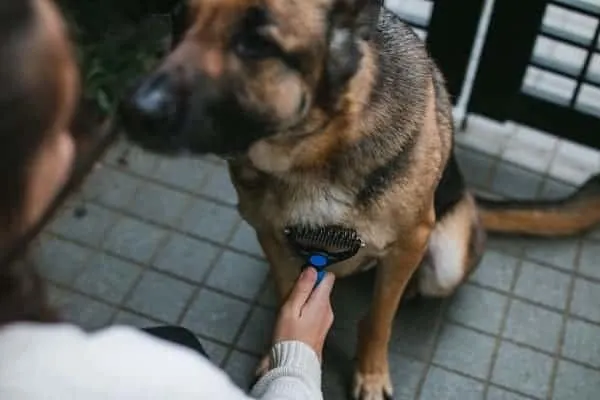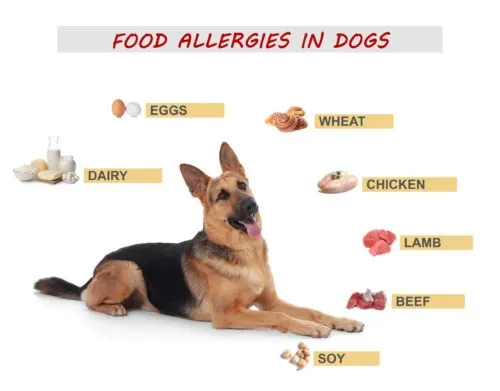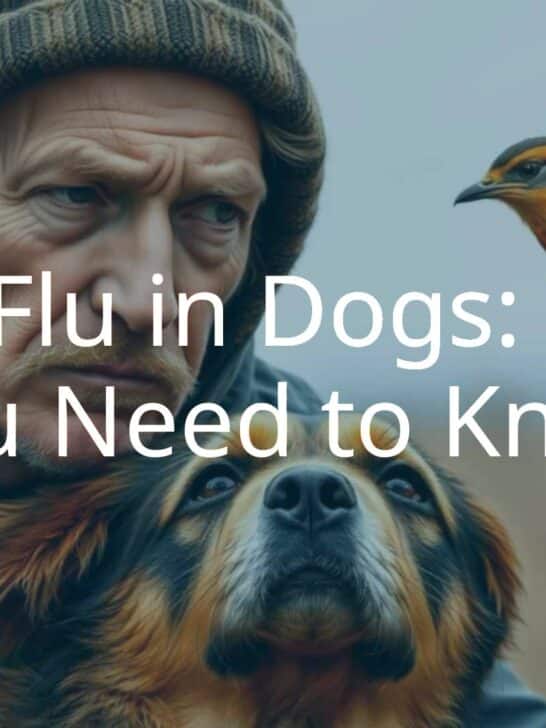Why Is My German Shepherd Scratching So Much? Skin Issues That Plague GSDs
German Shepherds have a very thick fur coat that is designed to protect the dog from all kinds of potential perils.
But GSDs also have a tendency towards skin issues and skin allergies that can cause a lot of scratching and discomfort.
You know how much it bothers you to feel itchy and not be able to get it to stop.
It can be even more stressful to watch your dog constantly scratching and itching and itching and scratching and not know what to do to help your dog feel better.

In this article, we dig down deep to discover why German Shepherds might start scratching a lot, what the underlying root causes could be, and what to do to help your dog feel better.
Why Is My German Shepherd Scratching So Much?
German Shepherds as a dog breed are particularly prone to skin allergies and skin issues. This is the most common reason why a German Shepherd might start scratching a lot.
Where many new GSD owners get confused is how allergies affect a dog versus how allergies affect a person.
In dogs, allergies most often cause the dog to lick, bite at or scratch the skin, ears, tail area, or paws.
Allergies may be caused by bacteria, fungus, pests, parasites, food, environmental toxins, pollen – many of the same triggers for allergies in people.
Why Is Your German Shepherd Scratching So Much?
As this thread on a popular German Shepherd owner forum highlights, it can sometimes be hard to tell if your dog is just doing minor self-care or cleaning or if the scratching is caused by something else.
You will probably struggle most to figure out which it is if you are new to owning a German Shepherd.
The longer you and your dog spend together, the more you will get familiar with your dog’s regular routines and begin to notice if something in those routines changes.
For example, maybe your dog suddenly starts scratching intensely at a certain area on one paw. This isn’t something you normally see your dog do, so it captures your attention.
You examine the paw more closely and see a flea clinging to the skin. This alerts you to the need for flea treatment. Soon your dog stops scratching the paw as the flea treatment begins to work.
In most cases, the reason your dog is scratching more than usual won’t resolve itself on its own.
In fact, the more likely outcome is that the issue will get worse and the affected area of skin will become infected, requiring more serious treatment.
Canine Pyoderma: A Severe Skin Infection in German Shepherd Dogs
As Veterinary Practice describes, canine pyoderma is one such severe skin itching issue that won’t resolve without veterinary intervention and treatment.
Pyoderma is caused by bacteria. Veterinary researchers do not fully understand how it gets started and why some dogs are more affected than others.
Dog breeds with underlying sensitivities to food, environment, allergens such as pollen, and pests are more likely to get pyoderma, which includes the German Shepherd dog.
Canine researchers believe there may be an underlying immune system issue that causes GSDs to be more prone to pyoderma and it may also be inherited.
Pyoderma is hard to treat and may recur many times. Usually, a combination treatment approach is required.
Once your German Shepherd is diagnosed with pyoderma, you may need to administer antibiotics, apply special medicated shampoos, change your dog’s food, apply topical treatments and have your dog tested for underlying thyroid or immune issues.
The warning signs of pyoderma often begin with intense sessions of scratching and itching.
Over time, this leads to skin lesions and this is when opportunistic fungi, bacteria, pests, or parasites move in and colonize the skin.
Pyoderma may be re-triggered by one or all of these issues, all of which can be present in a single dog at one time with more severe cases.
Skin Atopy and Scratching in German Shepherd Dogs
As Aubrey Animal Medical Center explains, German Shepherds as a breed are known to be particularly susceptible to allergies.
But in dogs, allergies are more commonly called “atopy.” What many dog owners don’t realize is that when your dog scratches repeatedly, this is basically the same as if you were to sneeze repeatedly.
In other words, where your allergies make your nose run and your throat itchy, in dogs allergies make their skin itch intensely.
Dogs can’t itch and scratch as effectively as you can, however. So instead of constant scratching, you might see your German Shepherd rubbing the body part that itches, licking it, biting at it, or pawing at it.
Certain areas of your dog’s skin are more likely to feel itchy because of atopy. These areas include the paws, the ears, areas where the skin is folded over, the belly, and around the tail area.
Different types of allergens may cause different areas of your dog’s body to itch.
For example, “Frito feet” is caused by a particular type of bacteria that often invades a dog’s paw pads in between the toes and gives off a corn chip-type odor.
Skin atopy is often very treatable, but only after you have been able to identify the specific trigger that is causing it.
German Shepherd owners are most likely to see their dogs suddenly start licking, biting, rubbing, pawing, or scratching at areas at ages one to three.
This is when atopy is most likely to start showing up, although it can happen at any time in your dog’s life.
But Doesn’t Scratching Mean Your German Shepherd Has Fleas?
Greencross Vets explains that a flea infestation is only one possible reason why your German Shepherd might be scratching.
It is true that fleas can irritate the skin to the point where other opportunistic bacteria, fungi, or parasites can get in and cause further irritation and itching.
But often a dog that is itching doesn’t have fleas at all. The itching is caused by something completely different.
However, if your dog does have even a minor issue with fleas and has an allergy to the bugs, this can cause more intense itching. When this happens, it is called flea allergy dermatitis.
Flea allergy dermatitis is a specific type of allergy to flea bites.
While getting bitten by fleas will cause itching for any pet (or person), in affected dogs the itching becomes severe and is often concentrated around the tail area.
For dogs with severe flea allergy dermatitis, all it can take is a single flea bite to set off the itching.
- Waterproof flea and tick treatment for dogs: Frontline Plus for Dogs provides waterproof, fast-acting, long-lasting flea and tick treatment and control for your dog.
Could Your German Shepherd Be Scratching Because of Mites?
Yet another cause of a sudden outbreak of scratching that doesn’t seem to have any cause is mites.
Mites are very tiny parasites that feed off the dead skin cells that your dog’s skin sheds. While they sound like they are insects similar to fleas, they are actually more like spiders, just in parasite form.
If you see little white flecks on your dog’s coat that appear to be moving, these are most likely mites carrying around their dinners of little skin flakes.
You definitely do not want to wait to get your dog treated for mites, because these parasites are what is called “zoonotic.” That means the mites can jump from your dog to you!
As well, the longer you wait to seek out diagnosis and treatment, the more likely a minor issue with mites will turn into sarcoptic mange, or scabies, a much more serious condition.
As Veterinary Partner explains, because the mites feed on dead skin, they like the more hairless areas on your dog like the ears, belly, or joints.
The adults mate and the females lay eggs in your dog’s skin, which hatch and cause intense itching as the young mites begin to move around.
Unfortunately, sarcoptic mange is not easy to diagnose because the symptoms are quite a lot like other skin allergies and conditions that can affect a German Shepherd.
Your veterinarian may need to rule out other issues and do several tests.
Even after a firm diagnosis is made, your dog will probably need a range of treatments, including antibiotics, topical shampoos or solutions, oral treatments, dips, and topical itch-relief products.
Animal Allergy & Dermatology of Colorado presents some very disturbing “before and after” images of dogs being treated for atopy (allergies).
You can see how severe the mange issues can become and also how effective treatment can be once a proper diagnosis is made.
Demodectic Mange Can Also Cause Intense Scratching in German Shepherds
The American Kennel Club (AKC) explains that a different type of mite causes demodectic mange, or Demodex, in German Shepherds.
The big difference between scabies and Demodex is that the scabies mite is a definite invader, while the Demodex mite is always present on the skin.
Typically, as long as your German Shepherd stays healthy with a strong immune system, the mites will live peacefully inside the hair follicles.
But if there is any disruption to the immune system function, the mites may start to cause itching.
The most common warning sign besides intense itching is patchy hair loss.
Some dogs may develop the condition in puppyhood, but in most cases, it only occurs if there is an underlying serious illness that weakens your dog’s system, such as diabetes.
Your veterinarian may recommend clipping your dog’s fur close and using dips and medicated shampoos or solutions as well as oral antibiotics or allergy medicines.
Food Allergies Can Cause Skin Itching in German Shepherd Dogs
As WebMD for Pets highlights, food allergies in canines are becoming an increasingly common issue for dog owners today.
In fact, current estimates indicate as many as 10 percent of all dogs alive today may be suffering from some degree of food allergies.
Interestingly, food allergies in people are also on the rise.
While researchers are not completely sure what is causing this uptick in interspecies food allergies, there are several suspects, from GMOs (genetically modified organisms) to global toxins.
Certain foods are known to be more prone to causing food allergies in German Shepherds and other dog breeds.
Chicken, fish, beef, eggs, dairy, soy, wheat (gluten), rabbit, pig (pork), and lamb are some of the most frequently cited food-based allergens.
However, a German Shepherd may also have sensitivities to additional foods. For example, peanuts are known to be more prone to fungus, which can cause intense allergies in some dogs.
It is important to identify which foods are triggering the scratching because you will need to make sure to eliminate these foods from your GSD’s diet.
Veterinarians who specialize in allergies and immunology are not sure exactly why dogs have sensitivities to foods that might ordinarily be a big part of their diets such as chicken and lamb.
Even if your dog previously was able to eat the food item, over time sensitivity can develop and it may be necessary to remove that food from the diet going forward.
One theory is that commercial livestock operations often give breeding animals and young animals antibiotics to try to ward off illness and infection.
When your dog eats the meat, the antibiotics kill some of the “good” beneficial bacteria in the digestive tract and create digestive issues.
Some breeds are also naturally more likely to have food allergies and German Shepherds are one of those breeds.
The best approach is to work with your dog’s veterinarian to identify what foods your GSD is allergic to and eliminate those from the diet. Your veterinarian will likely do some allergy testing to narrow down the search.
Another option many veterinarians prescribe is to adopt a limited ingredient diet to see if the symptoms clear up on their own.
Figuring Out What Is Causing Your German Shepherd’s Scratching
The German Shepherd Rescue of Orange County explains that it is important not to make any assumptions when your dog suddenly starts scratching.
Rather, it is important to rule out both behavioral as well as environmental causes to see what causes the itching to clear up.
Behavior reasons why your GSD might be scratching
Some German Shepherds may actually just need more enrichment, exercise, activity, or playtime.
Because the GSD is such a sensitive and intelligent dog breed, these dogs can start to self-harm by chewing at the skin if they get bored or lonely.
Boredom can lead to other destructive behaviors like digging, chewing things around the house, and barking.
Systemic reasons why your GSD might be scratching
Problems with thyroid function, endocrine disruption or immune system malfunction can also cause skin that dries out and becomes itchy.
Sometimes testing reveals a hidden metabolic or systemic disease or sensitivity that is the real cause of the itching.
Environmental reasons why your GSD might be scratching
German Shepherds can be very sensitive to environmental toxins, including exposure to herbicides or pesticides or insecticides, toxic house or lawn plants, air pollution, seasonal pollen, mold or mildew, and similar triggers for scratching.
It can be worth taking a second look at your lawn care and gardening products as well as what may be growing in and around areas where you and your dog walk regularly.
Other reasons why your GSD might be scratching
We’ve already discussed the impact of parasites such as mites, insects like fleas, and food-related sensitivities or allergies that could lead to a lot of skin itching.
The German Shepherd’s coat is so thick and camouflaging it can be hard to figure out what is going on under that thick double layer of fur.
Regular brushing and grooming can help you spot developing problems before they get out of control.
Going forward, when you brush your dog each week, take time to examine the skin, ears, paw pads, tail, and belly areas, joints, and face for any signs of skin redness, hot spots, irritation, or inflammation.
As well, it often helps to keep a journal so you can record what happened just before your dog experienced a bout of scratching.
Does your dog seem to itch more after meals or yard time? These are valuable clues that can help quickly diagnose and treat the scratching issue.
German Shepherd Itching Constantly? 9 Crazy Quick Solutions
Adjust their diet
As we mentioned, one of the causes of your German Shepherd’s itchiness may be a food allergy. There are many different types of hypoallergenic and sensitive dog foods.
These have been specially formulated to reduce the risk of allergic reactions as far as possible. This is a really cheap way to try and alleviate your dog’s itchiness and is a good first port of call.
Your dog’s diet is unlikely to be the sole cause of their itchiness, but it can greatly exacerbate other underlying issues.
By reducing the number of issues that their system has to contend with, you are likely to alleviate their itchiness.
Common allergens found in dog foods are dairy proteins, chicken, lamb, beef, eggs, gluten, and soy. As well as this any chicken meal, fat, eggs, cartilage, grains, lentils, peas, potatoes, flaxseeds, fish, and yeast.
If your dog is allergic to any of these things then their bodies will produce antibodies and antigens as part of its immune response.
If you suspect that this is one of the problems with your dog, your vet may ask you to do an elimination trial.
This is where you feed your dog a carefully controlled hypoallergenic diet for between 8 and 12 weeks.
This diet cannot contain any foods that your dog has consumed in the past and does not allow for your dog to be fed with treats or supplements.
Your vet may also perform a serum IgE test, which is a type of blood test. This will give them an indication as to what foods your dog may be sensitive to.
Alternatively, your dog may be itchy if they are not being fed appropriate nutrition. They may be deficient in vitamins, carbohydrates, proteins, or fats. The blood test will indicate this to your vet too.
Malnutrition can lead to disturbances in the protective layers of your dog’s skin. This can also cause itchiness. It is vital to feed your dog the correct diet to keep them healthy and well.
Incorporate supplements
As well to the supplements mentioned above, you may also like to incorporate omega-3 and omega-6 fatty acid supplements into your dog’s diet.
These will help to reduce inflammation on your dog’s skin, which could be a cause of their itching. This will also help to improve the quality of their coat, making it shiny and luxurious.
We recommend using an oil blend, such as salmon and hemp. This is unlikely to trigger an allergic reaction and will work beautifully to produce a healthy coat and skin.
To feed it to them, all you need to do is pour a little of the oil over the top of their kibble at mealtimes.
You will not notice results immediately after you begin to feed the oil blend to your dog. It is likely to take somewhere between 4 and 6 weeks to notice the benefits.
We strongly suggest that you begin to incorporate this fatty supplement into their diet before the cold season begins.
This will help to reduce the chances of your German Shepherd becoming itchy and ill over the winter.
We also recommend incorporating probiotics into your German Shepherd’s diet. These will help to boost their immune and digestive systems.
Probiotics will also help to reduce the inflammatory response of their bodies to any allergens present in their environment.
There is evidence to suggest that these supplements can also help to protect your dog from immunological attacks.
Change their shampoo
There are many different types of medicated shampoo that are ideal for treating itchy dogs. These will help to soothe their inflamed skin and reduce the itchy sensation.
They are super simple to use and relatively inexpensive to purchase.
Your shampoo should contain a compound known as coal tar. This is commonly used as a treatment for eczema and psoriasis as it is incredibly soothing on broken and irritated skin.
It is also a highly effective treatment for overly oily fur and dandruff.
You can purchase coal tar shampoos designed for both human and canine use. Take care to use a canine-specific shampoo as the human version will likely have a pH that will irritate your dog’s skin.
You should not wash your dog too often as this can also lead to problems. If you over wash your dog, you can strip the natural oils out of their coat and off their skin.
This can actually lead to even more itchiness and further complications. It is a good idea to bathe them every 3-4 months, or more often if recommended by your veterinarian.
You should always rinse your dog twice thoroughly to ensure all of the shampoo residues have come off of their coat.
Use moisturizer
There are many different moisturizing skin sprays and ointments available to treat your German Shepherd. These help to keep their skin hydrated, therefore reducing irritation and itchiness.
Sprays are highly convenient to apply throughout the day and will not cause you much inconvenience.
You should look for sprays and ointments that contain Vitamin E and aloe vera. Both of these are very moisturizing and will massively help your dog.
Apply liberally to areas that seem most affected. These sprays are clinically formulated to have veterinarian quality impacts from the comfort of your home.
For really itchy and affected areas, it is wise to use an ointment or thicker cream for more of an impact. This can also be applied to small cuts and sores for instant relief.
Groom them regularly
Brushing your dog’s fur will help to evenly distribute the oils around their skin and coat. It will also help to eradicate any loose hairs that may be causing them irritation.
We recommend grooming your German Shepherd with a rake brush with rounded tips, 2 to 3 times per week.
During shedding season, in the spring and fall months, you will need to brush your dog every day.
This is because they will be losing a huge quantity of fur and will need some assistance to ensure the dead hair does not just collect in their coat.
If your dog lives indoors, they are likely to shed slightly less than outdoor dogs.
Ideally, this brush will have a double row as these will remove the most hair with ease. Use soft but firm strokes in the direction of hair growth.
We recommend using a rake brush. This is because German Shepherds have 2 coats of hair, and this type of brush will remove dead hairs from their undercoat.
Neglecting to brush your dog will result in a thick blanket of hair growing over the skin and preventing adequate air circulation.
This means that their oil glands can become clogged and can make your dog incredibly itchy.
Wash them often
This is a particularly important step during allergy seasons such as late spring and summer.
If your dog is sensitive to pollen and goes outside, they will drag the pollen back in with them on their fur. This can cause them to have continuing allergic reactions, even when indoors.
It may be a good idea to wipe your dog’s legs, paws, muzzle, and belly with hypoallergenic wipes once they come into your home.
This will reduce the amount of grass and pollen that they come into contact with and can reduce allergic reactions.
Invest in a humidifier
If the air is particularly dry, this can cause your German Shepherd to itch too. This is particularly prevalent during the winter months when electric heaters and log fireplaces are running.
This can dry out the air, and by extension, your dog’s skin.
Humidifiers work by introducing more moisture into the air. This can help to alleviate some skin conditions and improve the overall health of your dog.
They can emit either a warm or a cool mist, and some are capable of both.
You should place the humidifier close to where your dog spends most of its time. This will help to ensure they get as much benefit from the humidifier as possible.
It is a good idea to place the humidifier out of reach of your dog to ensure they do not knock it over and hurt themselves.
Do not point it directly at your dog as they may become wary and move if any mist or discharge from the humidifier is suddenly sent their way.
Do not use fragrance sprays
The respiratory and olfactory systems of dogs are far superior to that of humans.
Their sense of smell is more than 400 times stronger than a human, meaning that they are incredibly sensitive to odors.
There are many smells, such as ylang-ylang, which can actually irritate and cause harm to your dog.
If your German Shepherd is already itching, their symptoms may be worsened by the use of room fragrances or perfume sprays.
We do not recommend burning scented candles or incense in the vicinity of your dog. In extreme cases, you may wish to consider stopping using aerosol deodorant and perfume sprays.
Change your household cleaning products
Commercially available cleaning products can cause your dog to itch. Many chemicals can trigger allergic reactions or respiratory issues in your dog.
There are lots of naturally formulated cleaning products available that will reduce the reactions in your dog.
Look for products that are fragrance-free and hypoallergenic. Allow all surfaces that have had chemicals applied to them to dry completely before you let your dog near them.
Other home remedies for itching
A completely natural way to treat your dog is through the use of apple cider vinegar. Use this as a rinse to alleviate symptoms of itching. Dilute it in a 1:1 ratio with purified water and put it into a bottle.
Wash your dog as normal with a mild castile soap and then rub the apple cider vinegar into their fur. Ensure all areas of their body are covered, paying close attention to their belly and legs.
Take care not to get the vinegar into their eyes as this will hurt them. Do not use this on open wounds or raw skin as it will burn and hurt your German Shepherd.
Do not rinse this off, instead allow it to air dry on their skin and fur. This can also be applied topically throughout the day to alleviate itchy hotspots.
It can also be used to clean out their ears and can be ingested for digestive issues. Apple cider vinegar is an anti-inflammatory, anti-fungal, and anti-bacterial agent.
You may want to consider incorporating olive oil into their diet. Olive oil is high in vitamins K and E, as well as antioxidants.
These are all very beneficial for your dog’s health and it is easy to just pour a tablespoon on top of their kibble. Do this 2 to 3 times per week to help alleviate itchiness and improve the quality of their fur.
Another good incorporation into their diet is plain yogurt. Take care to ensure that this is one that has no additives or sugar, as these will be bad for your dog.
The yogurt will contain probiotic cultures that will help to maintain a healthy bacterial balance in their gut. It can help to prevent yeast infections and skin issues.
For small dogs, add in a teaspoon of yogurt 2 to 3 times per week. For large dogs, feed them 2 teaspoons.
Coconut oil is another great and easy home remedy. Apply it topically to dry skin as a moisturizer or give it orally to your dog as an immune booster.
It is also really useful as a human moisturizer and is delicious to boot.
We have all heard of oatmeal baths for chickenpox, but did you know that this can be done for dogs too?
Grab some oatmeal and place it into a high-powered blender and blend until a powder has formed. Fill your bathtub with warm water and pour in the oatmeal powder.
Allow this to combine for a few minutes and then bring your dog in. If possible, allow your dog to soak in this bath for 15 minutes.
Performing this bath regularly will help to reduce the overall itchiness of your dog and make their life more comfortable.
You can also make herbal tea soaks for your dog. These can be done with chamomile, calendula, and green teas.
All of these teas have soothing properties and will help to reduce itchiness. This is particularly useful for dogs with red raw skin that cannot stop itching.
To make this soak, fill your tub with warm water and throw in around 5 tea bags. Leave them to steep here for 3-5 minutes and then take the bags out of the water.
Bring your dog into the bath and allow them to soak in the tea for around 5 minutes.
If the itching is localized to smaller regions, steep a couple of tea bags in a jug of warm water. Allow it to cool and then pour over the affected patches and allow the tea to air dry.
For more natural home remedies, take a look at this video.
Learn About German Shepherd Scratching From a Canine Veterinarian
In this YouTube video, you can watch a canine veterinarian examining a German Shepherd dog patient who is struggling with ongoing itching and scratching issues.
As you will notice, the veterinarian takes a look at the dog’s skin and paws and talks with the owner about possible issues with pests, fleas, saliva allergies, seasonal allergies, and also signs of other skin issues like mange.
If you have tried to identify what might be causing your dog’s itching and scratching and you can’t see any visible triggers, it is definitely time to call in the pros to help diagnose your dog’s issues and get the right treatment.
























